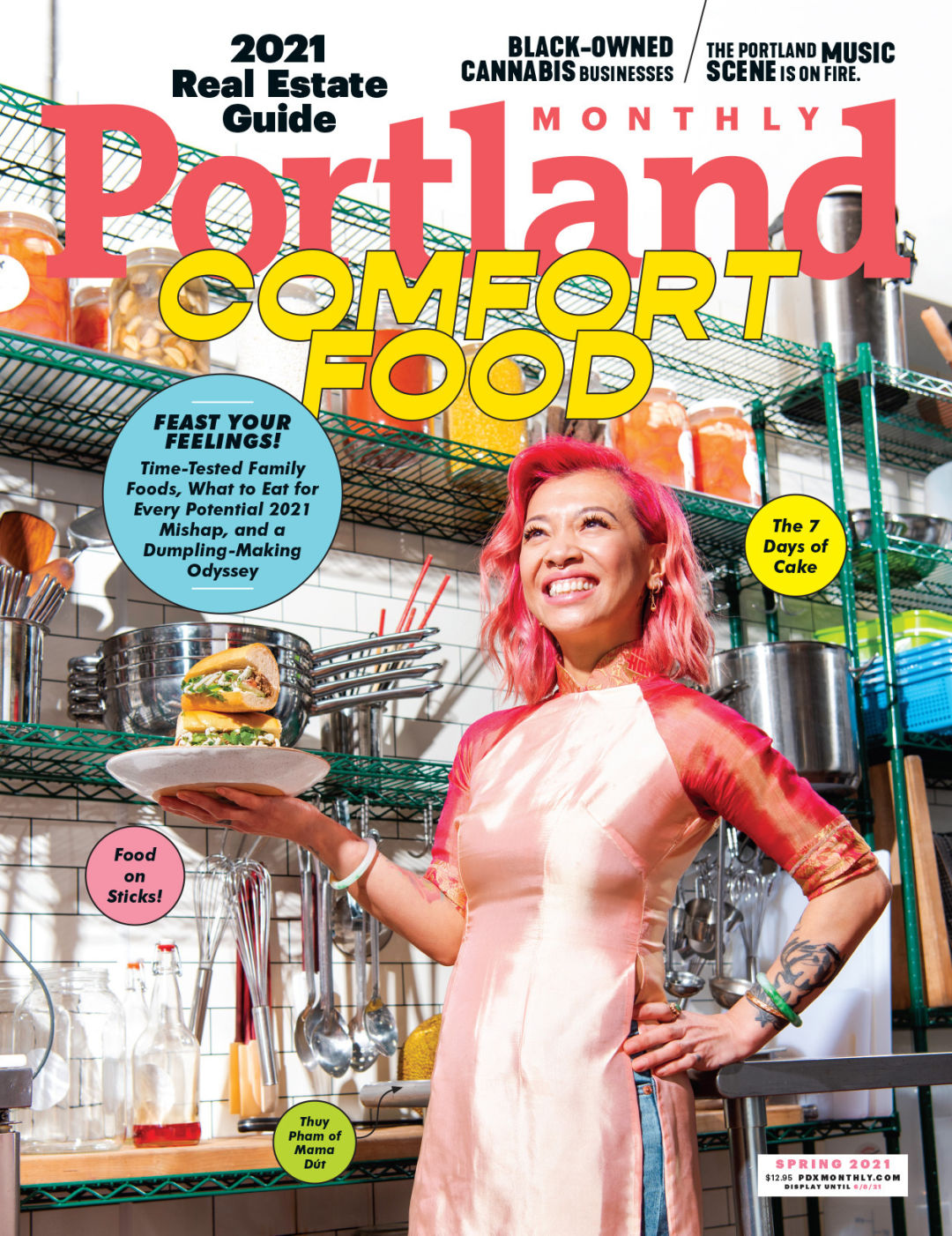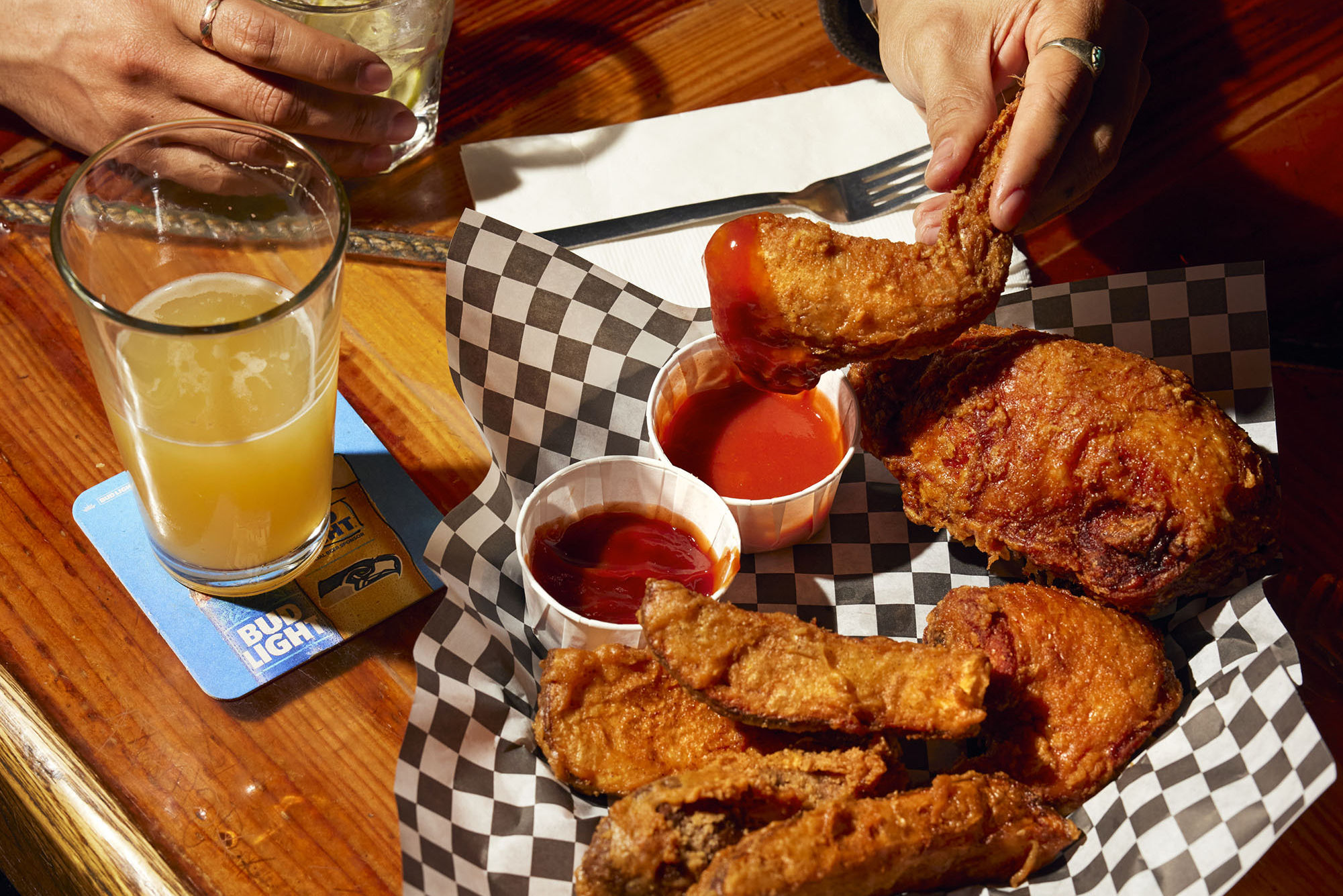A Note on Our Spring 2021 Issue Cover

Image: Thomas Teal and Michael Novak
We’re very excited and proud to feature chef Thuy Pham of Mama Dút Foods on the cover of Portland Monthly’s spring issue. We don’t often feature chefs, or faces at all really, on our covers (we tend to hook our readers with beautiful scenery or tantalizing food instead), so this is big for us. We chose Pham not only because her new restaurant is one of the hottest in town and serves up a mean turmeric bánh xèo waffle, but also because we think she radiates the joy, resilience, and celebration that we could always use more of in Portland—all while decked out in her áo dài, proudly repping her Vietnamese heritage.
For the past seven years, Thuy Pham had been working as a hairstylist in her own private studio in Southeast Portland, attracting clients from as far away as the Bay Area and Seattle for her skill transforming Asian hair, which is infamously hard to bleach, into fantastical hues of blue, purple, pink, gray, and blonde. Business, of course, came to an abrupt halt when salons were mandated to close in March 2020. So she and her 7-year-old daughter Kinsley started making Vietnamese vegan pork belly—a traditional Buddhist recipe—on Instagram Live. Soon, she was bombarded with DMs from hair clients asking to order some, and she started selling out of pork belly every week.
Within a nearly unprecedentedly short period of just a few months, Pham went from a pop-up at the former Farm Spirit space to her very own brick-and-mortar restaurant on SE Belmont. The name of her restaurant is Mama Dút, a phrase her daughter coined that translates to “mama, feed” in a mixture of English and Vietnamese.
Our spring food feature’s theme is comfort food, with a focus on chefs serving dishes their mothers made for them—and Pham immediately came to mind. Her dishes meld playfulness, creativity, home cooking, and tradition. Bánh xèo, which is traditionally stuffed with pork belly and shrimp and made in a pan, was one of Pham’s favorite dishes that her mom would make for her growing up. Now, Pham has made a vegan version of bánh xèo, made in a waffle iron and stuffed with fried chanterelle mushrooms—and it’s earned a seal of approval even from her own mom, who’s a staunch supporter of keeping her dishes traditionally Vietnamese.
In less than a year, Pham has become one of Portland’s most talked-about chefs, scoring recognition in Portland Monthly, Eater PDX, and The New York Times. But Pham says she couldn’t have imagined this kind of celebration a year ago, much less when she was a child. Pham and her family fled war-torn Northern Vietnam when she was just two years old. As a child growing up in Southern California, she was frequently the only Vietnamese student among her peers.
“I grew up being so ashamed of being Vietnamese, and so ashamed of my food culture. I remember being a kid and telling my mom, ‘I don't want to take Vietnamese food [for lunch],’” Pham recalls.
That feeling didn’t change when she moved to Portland at age 16 in the mid-nineties.
“The Vietnamese community was relegated to this small section of Sandy Boulevard,” Pham says. “I even remember being told to go back to my own country.”
Pham gets emotional when she talks about her restaurant’s triumphs. “The success of Mama Dút, it means so much more than just its actual success on the surface level,” she says. “It’s validation for so many childhood traumas about being Vietnamese. It gives me hope for my daughter and other Asian kids out there who may be feeling shame about their culture.”
Now, in her brick-and-mortar restaurant in Southeast Portland, Pham finally feels a sense of redemption and belonging for her, her family, her culture, and her food. And we think that’s ultimately what comfort food is all about: food that makes you feel hugged, loved, and wanted. We hope that a lot of Portlanders see themselves and their families in these stories, too.
“I'm in a neighborhood that is predominantly white, that I never thought in a million years that I could even be able to afford to be in. I am in a business and an industry that is predominantly led by white male owners,” Pham says. “And when I think about my success now, it makes me cry because I wish that that little girl [could] see that there's value in her culture’s cuisine.”



